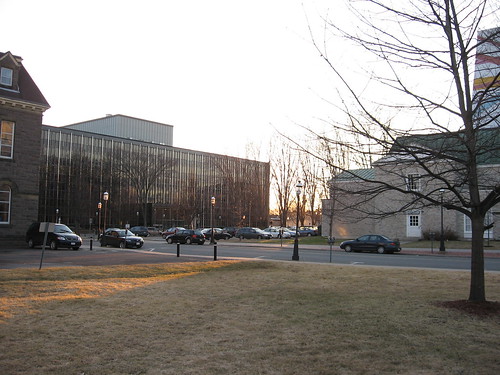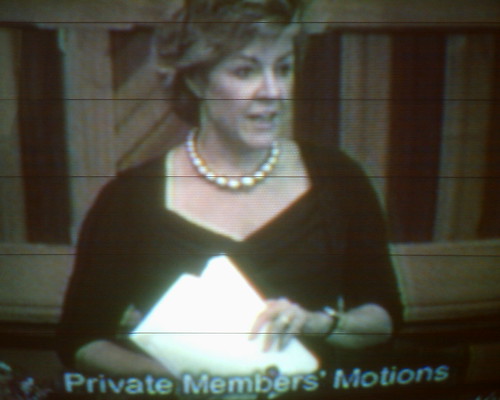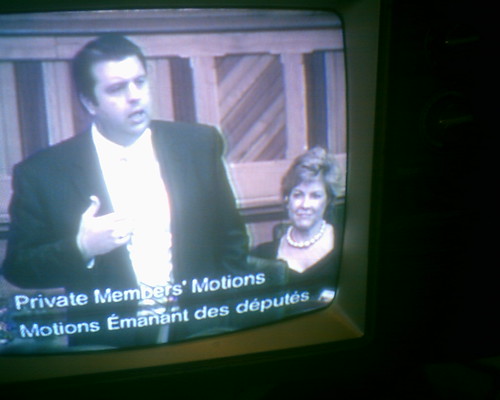The next few days are suppose to be bad. This is the first picture I post with my new camera. Thanks again to the individual!!!!
Wednesday, April 05, 2006
CHARLES ALMOST TOOK AN HEART ATTACK AT THE NEW BRUNSWICK LEGISLATURE!!!!
A DELIVERY PERSON WAKES CHARLES UP AT 7:30AM BUT IT WAS WORTH IT!!!!
QUESTION PERIOD AT THE NEW BRUNSWICK LEGISLATURE!!! < Monday >

ORAL QUESTIONS 12 QUESTIONS ORALES
April 4, 2006 Not finalized / Non finalisé le 4 avril 2006
S:\HANSARD\HANSARD DAILIES - FASCICULES\2005-2006 55-3\17 2006-04-04 BL\17 2006-04-04 BL.wpd 1/11
Aboriginal Peoples
Mr. S. Graham: This week, we welcomed the opening of the House of Commons in Ottawa. There
is a new Prime Minister in place, and while we may question his policies, we do not question his
sincere desire to serve in the best interest of all Canadians and of all New Brunswickers.
There are a number of issues, however, pertaining to federal-provincial relations, which concern us
today. My first question is for the Premier, and it pertains to the Kelowna accord, which was signed
last November. This was a $5.1-billion blueprint for alleviating Aboriginal poverty in Canada and
strengthening relations with First Nations from coast to coast. The government of New Brunswick
pledged support for this Kelowna accord at the first ministers meeting where it was finalized, but
the new Conservative government of Hon. Stephen Harper has yet to indicate whether he will
honour this historic agreement.
My question to the Premier this afternoon is this: What steps are you taking to make sure that your
signature is honoured with this accord?
Hon. Mr. Lord: There was a very good meeting in Kelowna, B.C., and I was pleased to be there
to represent the people of New Brunswick. Leading up to that meeting, I held a series of discussions
with Aboriginal leaders in the province, to hear their thoughts and their views on how we can deal
with some of the major issues that they face in New Brunswick. We intend to continue our work
with Aboriginal leaders here in the province, and we will certainly work with the new federal
government to see what it wants to do to address the issues of poverty, job creation, health care,
wellness, social programs, and housing that the Native people have throughout the country.
Mr. S. Graham: May I remind the Premier that work has been finished. In fact, an accord was
signed—and he fully supported it—on how to address the issues facing First Nations communities,
in New Brunswick and across the country, pertaining to health care, education, and housing. It is not
an issue of consultation. It is now an issue of honouring the agreement that was signed—your
participatory signature of this agreement.
My question to you today, Mr. Premier, is this: When we met with the First Nations Chiefs a number
of weeks ago, their number one concern with us was that New Brunswick had still not taken a
position on whether we were going to force the government to honour this historically signed
agreement. Mr. Premier, are you prepared to take that step here today, to ask Stephen Harper to
honour this agreement?
016 14:10
Hon. Mr. Lord: I am certainly willing to respect the choice of the Canadian people to elect a new
government. I am very pleased with the new government in Ottawa. We have an outstanding, strong
ORAL QUESTIONS 12 QUESTIONS ORALES
April 4, 2006 Not finalized / Non finalisé le 4 avril 2006
S:\HANSARD\HANSARD DAILIES - FASCICULES\2005-2006 55-3\17 2006-04-04 BL\17 2006-04-04 BL.wpd 2/11
relationship with the current Prime Minister and with the new government. We finally have a Prime
Minister who wants to respect provinces and respect the jurisdictions of different levels of
government. That bodes well, because we also respect the jurisdictions of different levels of
government. We acknowledge that we are here in New Brunswick, wanting to work with the
Aboriginal people of New Brunswick, but we also respect the fact that they fall under the
jurisdiction of the federal government.
Mr. S. Graham: In Canada today, we may have the third-best conditions in the world with respect
to living situations. The bottom line is that First Nations communities living in Canada are ranked
at 63. There is a stark contrast between First Nations communities and the communities in which
we live, and that is why it is very important that we honour this agreement to help make up for the
disparity that exists today with First Nations communities in New Brunswick.
When I met with the chiefs of New Brunswick, their position was loud and clear. The work was
done. You signed on to this agreement. You said it was a blueprint that was needed. That is why you
put your signature in place. Now I am asking you: Are you prepared to fight to have that
commitment honoured?
Hon. Mr. Lord: As I have stated, I was very pleased to participate in the meeting in Kelowna, and
I believe that important work has been done here in New Brunswick and throughout the country. We
will continue to work with the federal government. The funding that was in place that was
announced at Kelowna is entirely federal. It will be up to the federal government to decide how and
where it wants to allocate the funding.
In New Brunswick, we have taken measures in terms of direct wood allocation for Aboriginal
people. There have been some agreements with regard to taxes and certain revenues, where the
Aboriginal people get treatment that can help them develop their economy for economic growth and
social development. Those are in place. We have talked about those issues with the chiefs here in
New Brunswick. I will make the commitment that I will continue to work with the Aboriginal
people of this province to raise the living standards, the economic output, and social progress for
the Aboriginal people in New Brunswick.
Mr. S. Graham: I want to make it very clear that what the Premier is not saying today is that the
work that was accomplished with the Kelowna accord, a $5.1-billion agreement that was signed to
alleviate Aboriginal poverty in our province . . . Now he is saying that they want to go back to the
drawing board and see how they can reallocate those dollars. What the First Nations communities
and the leaders of these First Nations communities want from this Premier is for him to say that he
is going to honour his signature on this agreement.
On December 6, 2005, in the speech from the throne opening the third session of the 55th
Legislative Assembly of New Brunswick, the government of this province notoriously pledged to
prepare a New Brunswick First Nations education strategy, to conduct a First Nations housing
ORAL QUESTIONS 12 QUESTIONS ORALES
April 4, 2006 Not finalized / Non finalisé le 4 avril 2006
S:\HANSARD\HANSARD DAILIES - FASCICULES\2005-2006 55-3\17 2006-04-04 BL\17 2006-04-04 BL.wpd 3/11
conference, and to create a First Nations health blueprint and a First Nations economic development
plan. This was in your speech from the throne. The Mi’kmaq and Maliseet chiefs of New Brunswick
have recently complained that they have yet to be consulted on any of these planned initiatives. They
are unaware of any action taken by this government on these pledges.
(Interjections.)
Mr. Speaker: Order, please.
Mr. S. Graham: Can you indicate to this House the steps that have been taken to fulfill these
specific pledges that you made to the First Nations communities of New Brunswick in your throne
speech?
Hon. Mr. Lord: I myself met with the chiefs and held roundtable discussions with the chiefs. When
the Leader of the Opposition says that there was no consultation, he is distorting the facts. He is
totally incorrect with the truth. We will continue to work with the Aboriginal people of this
province. We have a minister who is in charge of Aboriginal affairs. We created New Brunswick’s
first Aboriginal Affairs Secretariat. We hired a deputy minister from the Aboriginal community to
help us have a better liaison with the Aboriginal community, and we will continue that work. We
know there are some issues with the Aboriginal people in this province. We know that their full
economic potential has not yet been realized. We know that there are some social issues that need
to be addressed, and we want to do it in cooperation, in partnership, with them. We also want the
federal government to be fully engaged.
017 14:15
Mr. S. Graham: If the Premier had been listening in this meeting with the First Nations leaders, he
would have heard the message loud and clear that they want this province to honour the agreement
on which this Premier has his signature. He is not prepared to stand up to the Prime Minister of
Canada and say: Honour the agreement that was signed.
Funding
Yesterday, the minister for ACOA said that federal funding to build a new stadium in Moncton for
the 2010 world track and field championships may be put on hold. Yesterday, I had an opportunity
to meet with the Mayor of Moncton and congratulate him publicly on the success of securing this
important initiative. My question to the Premier today is this: Can you confirm that the province
remains committed to its share of funding for the project? What component of the $5-million pledge
is included in this current budget?
Hon. Mr. Lord: I think the Leader of the Opposition just cannot stand the good news, and cannot
stand the great relationship we have with the federal government, because that really throws him off
ORAL QUESTIONS 12 QUESTIONS ORALES
April 4, 2006 Not finalized / Non finalisé le 4 avril 2006
S:\HANSARD\HANSARD DAILIES - FASCICULES\2005-2006 55-3\17 2006-04-04 BL\17 2006-04-04 BL.wpd 4/11
his game. The members opposite love it when things go bad in New Brunswick. When things go
well, they have a hard time accepting that. Let me tell you that we love it when things go well in the
province of New Brunswick. We are not done. I have spoken personally with the Minister of
Intergovernmental Affairs for the federal government, who is also the Minister for Sport. He
confirmed to me that the funding is in place. Our office has been in contact with the Office of the
Prime Minister. I have no concerns whatsoever that the federal government will deliver on its
commitment.
With regard to the question, the budget that was tabled last week for the fiscal year 2006-07 does
not contain any money whatsoever for the funding of the stadium. That money was delivered in the
fiscal year that ended March 31, 2006.
Mr. S. Graham: When we hear Peter McKay say today that it is not currently in the budget, that
an official application has not been made, that is a cause for concern. In talking yesterday with the
Mayor of Moncton, he very clearly outlined that we need to move aggressively on this project,
because it will allow a volunteer base to be established, and it will allow the city of Moncton to host
world-class events prior to the world junior track and field championships being held. In fact, it will
allow Moncton to apply to host the national track and field championships or the junior track and
field championships. If the money is in the current fiscal period, we welcome that news. The cause
of concern today is the mixed message coming from the federal government. That is why we are
asking you to make sure to press the fact that its portion is included in the upcoming federal budget.
Hon. Mr. Lord: Our government could not be more aggressive in supporting the city of Moncton
and the université de Moncton in their efforts. I want to state, as the MLA for the riding of Moncton
East, that I am extremely pleased that this stadium will be built in the riding of Moncton East. I am
pleased to deliver once again and to get results for the people of Moncton and the people of New
Brunswick. This is a great investment.
I want to correct the Leader of the Opposition. The money is not in the current fiscal year. The
money is in the fiscal year that ended Friday, March 31, 2006. Our money is there. The city of
Moncton knows that we are there to support them. We want them to go ahead and build the stadium
as quickly as possible and to bring many attractions and competitions to our city and to our great
province, because this will be a great addition. It fully supports the Five in Five Initiative that we
put in place. It helps us make New Brunswick the investment province; it also helps us make New
Brunswick the wellness province.
I am pleased that the federal government wants to be a partner, because until two months ago, the
federal Liberal government had done zero. It had not delivered one cent for this stadium. It had
failed at the task. It was not even in the running. It was totally absent. I am glad that there now is
a new federal government, that it wants to be our partner, and that it will be there for us.
ORAL QUESTIONS 12 QUESTIONS ORALES
April 4, 2006 Not finalized / Non finalisé le 4 avril 2006
S:\HANSARD\HANSARD DAILIES - FASCICULES\2005-2006 55-3\17 2006-04-04 BL\17 2006-04-04 BL.wpd 5/11
Employment
Mr. S. Graham: During the last federal election campaign, when Peter McKay was in the
Miramichi region, he promised that a new Conservative government would maintain a minimum
of 200 important federal jobs in the region regardless of the future of the Canada Firearms Centre.
018 14:20
Yesterday, Prime Minister Harper told the Canadian Professional Police Association that his
government would be abolishing the Canadian Firearms Centre. My question to the Premier today
is this: Have you taken any action to prevent the loss of these 200 jobs in the Miramichi, which has
a direct payroll of $8 million to the local economy?
Hon. Mr. Lord: I see a theme developing today that the Leader of the Opposition still wants to
defend his federal Liberal cousins. He may want to fight their last election and he may want to fight
his own last election—that is up to him.
I want to state very clearly the position of the government of New Brunswick. Our position for seven
years has been that we feel that the gun registry has been a waste of money. We have felt all along
that this was not the right policy. At the same time, when I met with Prime Minister Stephen Harper,
I raised the issue. I suggested to him that as they proceed in eliminating the gun registry, they need
to protect the jobs in the Miramichi and find other valuable work for the people living and working
in the Miramichi. That is the official position of the government of New Brunswick which was
transmitted directly by myself to Prime Minister Stephen Harper.
Mr. S. Graham: The issue we are raising today is the fact that 200 jobs in the Miramichi have the
potential to be lost, which has a direct impact on the economy of $8 million. That is the issue we are
debating today. When the union representing the 200 workers wrote to your office on March 22, you
turned down a meeting with the local union. In the letter, you said that the subject is just at the study
stage and is of a premature nature. Mr. Premier, it is not of a premature nature. You have stated in
this House that you talked with Stephen Harper about it. Now it is important to follow up with action
and not just words.
My question to the Premier is this: What commitment do you have from Prime Minister Harper that
200 jobs for another government department will be placed in the Miramichi?
Hon. Mr. Lord: I think the Leader of the Opposition should be more accurate in his questions. I
would like him to table the letter that he is reading from. Table that letter. The Leader of the
Opposition says that I stated . . .
(Interjection).
ORAL QUESTIONS 12 QUESTIONS ORALES
April 4, 2006 Not finalized / Non finalisé le 4 avril 2006
S:\HANSARD\HANSARD DAILIES - FASCICULES\2005-2006 55-3\17 2006-04-04 BL\17 2006-04-04 BL.wpd 6/11
Hon. Mr. Lord: The Office of the Premier—let’s not be so loose and liberal with the facts. The
facts are that our minister Rose-May Poirier has met with the group. We set up a meeting for this
afternoon to meet with the representatives who are in this Chamber, and I would be happy to meet
with them. Our position has been clear, and I have indicated to the Prime Minister and to the federal
government that we support their decision to scrap the gun registry, but we want them to find work
for the capable New Brunswickers working in the Miramichi. They want to provide a valuable
service to the federal government, and we support that.
Mr. S. Graham: If the Premier is so intent on hearing the correspondence that comes from his
office, I will read it to him:
On behalf of Premier Lord, I would like to acknowledge receipt and thank you for your letter dated
March 9, 2006 in which you request a meeting to discuss the Canada Firearms Centre in Miramichi.
Due to the fact that this subject is only at the study stage, we believe that your request to discuss this
matter with the Premier is of a premature nature.
We encourage that you continue to work with your local Member of Parliament.
Two weeks ago, you denied this request. Yesterday, Prime Minister Harper said he is closing the
registry. It now is not at a premature stage. We need a commitment that you are going to work very
hard with the federal government to see 200 other jobs from a new department come to the
Miramichi.
Hon. Mr. Lord: As I indicated in the previous answer, Minister Rose-May Poirier met with
representatives. She raised the issue with me. She personally asked me to meet with the
representatives, and I said yes. She has organized a meeting for this afternoon. I am happy to meet
with them. Our position has been clear. We will not defend the wasteful use of taxpayers’ dollars
by the previous Liberal government to set up a gun registry system that has cost Canadians billions
of dollars. We will fully support the people in the Miramichi in protecting jobs for people who can
offer good services and do something useful for the Canadian public. We support that.
019 14:25
Since the Leader of the Opposition wants to be very liberal with the facts, let me just add that, when
he talks about the Kelowna accord and he tries to suggest that deals were signed, no accord was
signed. My signature does not appear on a document with the federal government and other
provinces. Therefore, we might as well make the facts clear. The Leader of the Opposition is very,
very liberal with his facts, and that is why it leads to incorrect information.
ORAL QUESTIONS 12 QUESTIONS ORALES
April 4, 2006 Not finalized / Non finalisé le 4 avril 2006
S:\HANSARD\HANSARD DAILIES - FASCICULES\2005-2006 55-3\17 2006-04-04 BL\17 2006-04-04 BL.wpd 7/11
Enseignement postsecondaire
M. Lamrock : Encore une fois, le gouvernement domine la course pour être le pire du pays. Cette
fois, je parle de l’accessibilité aux études universitaires. Une nouvelle étude du Educational Policy
Institute dit que le Nouveau-Brunswick est la deuxième pire province au Canada à aider nos citoyens
à avoir accès à l’enseignement postsecondaire et la quatrième pire province en Amérique du Nord.
Malheureusement, les raisons pour nos mauvais résultats sont les faibles revenus — un ancien but
du plan de prospérité où le gouvernement a échoué —, les droits de scolarité élevés et le manque
d’aide financière aux étudiants — un autre but où le gouvernement est maintenant en train
d’échouer.
Je sais bien que la situation est sérieuse, mais, comme première question, j’aimerais poser une
question facile au nouveau ministre. Dans le budget, nous avons vu que l’initiative Cinq en cinq est
seulement une répétition des anciennes mesures. Croit-il qu’il y a assez de mesures dans ce budget
pour renverser la tendance de devenir la pire province au Canada à offrir l’accès à l’enseignement
postsecondaire?
Mr. Carr: It is a great pleasure to get my first question as the new Minister of Post-Secondary
Education and Training today, and I am very proud. In relation to the report that the member
opposite is citing, first, it is already outdated by four years. Second, I am very proud of the actions
that this government has taken. Premier Bernard Lord, in our vision, increased funding for university
infrastructure and increased funding for universities by 34%. Student aid grants increased by 215%.
Access to student loans has been changed to allow for more access. In addition, we have the first
Canadian tuition cash-back program, which will result in $63 million returning to the hands of the
students when it is fully in place. It is a record and progress of which I am very proud.
Mr. Lamrock: Sticking to your talking points may get you to Cabinet, but it will not make you a
memorable minister. In actual fact, after all that, the minister could not say that there was enough
in this budget to turn this trend around. I actually gave him an easy question: Is there enough?
However, he did not say it, because there is not. It is amazing. He says that some of the numbers are
four years old, but if he checked the tables, some of them are not. In actual fact, some of the
programs that he announces and the announcements that he cites are even older than that.
In other jurisdictions, as is noted in this report—in fact, we have actually lost ground in wages since
this report came out, by the way—southern U.S. states, through HOPE scholarships, have managed
to help people on the front end to go to university, rather than just giving them a tax credit after they
are done. There is tuition relief in southern and western states that are at the top of the group. Other
provinces have invested aggressively to help students with high debt with bursaries. None of that
is in this budget, yet this report says that those are the things that put the jurisdictions at the top of
the scale. It is one thing to say that we will cut your taxes when you are done, but his own
commission, the MPHEC, says that lower-income New Brunswick families are declining in their
participation because they are not going in the first place.
ORAL QUESTIONS 12 QUESTIONS ORALES
April 4, 2006 Not finalized / Non finalisé le 4 avril 2006
S:\HANSARD\HANSARD DAILIES - FASCICULES\2005-2006 55-3\17 2006-04-04 BL\17 2006-04-04 BL.wpd 8/11
There are three good ideas that other states have done. With a firm date, if not in this budget, when
will this minister bring one of them to this Assembly?
Mr. Carr: Of course, the same old Liberal tactic of negativity is very evident today. The opposition
constantly says that we are doing nothing, and that could not be further from the truth. We have
some real, concrete solutions, and our Premier has taken a leadership role in our country to promote
postsecondary education in New Brunswick. Let me remind the House that, in four of the five last
years of the government opposite, it cut funding to universities. Our Premier and our government
have changed that direction. We have increased funding to universities. We have more to do, and
we are going to do more.
Mr. Lamrock: We are off to a bad start. It is one thing to compare yourself to a government of eight
years ago, but this minister does not want to compare himself to what could be done. There are three
new ideas. Regarding HOPE scholarships, this report says that they put states at the top of the list.
020 14:30
Bursary help for high-debt students—once again, the minister could not talk about it. Another
positive idea was looking at tuition relief. The states and provinces that have done it are at the top
of this list. This minister did not want to talk about it. There were three positive ideas and no
positive response—just a trip back to 1999.
The fact is, if we want to turn around our demographic trend, it is not enough to be second last. If
we want to attract young professionals, we should first be attracting them to our universities by
making them the most affordable.
The most that the minister could say in the Daily Gleaner was that he hoped the federal government
would come and help us. The problem with that is that if we wait for the federal government to lift
all the provinces up equally, we are still second last. We are still losing the demographic race.
My question is this: Will this minister be able to say . . . He cannot wait for the federal government
to do something for all of us. Will he commit to a firm date when we will move up from second last
in the country in terms of affordability of postsecondary education? When will he look at one of the
three positive new ideas we have presented today? If he will not do that, that is a heck of a reason
to vote against the budget.
Hon. Mr. Carr: Of course, the strategy of the Liberals in the past is not one we are going to
embrace, because it was a strategy of cutting funding to universities. Again, this government has
been cleaning up the mess of the previous government, and I am not going to shy away from that.
The fact is, we have increased funding for infrastructure . . .
Mr. Speaker: Order, please.
ORAL QUESTIONS 12 QUESTIONS ORALES
April 4, 2006 Not finalized / Non finalisé le 4 avril 2006
S:\HANSARD\HANSARD DAILIES - FASCICULES\2005-2006 55-3\17 2006-04-04 BL\17 2006-04-04 BL.wpd 9/11
Hon. Mr. Carr: . . . to record levels. We continue to have a vision for the future. The Premier has
said it is a five-in-five vision of making New Brunswick the smart province, the best province in the
country to learn, and an even better place to stay and work. We have been making New Brunswick
an economic engine. In fact, last year, we were 1 of only 2 provinces that increased wages and
household incomes. We are going to continue on that path. Again, we have launched a commission,
which is very concrete, to plan for the future of postsecondary education.
We have done a lot, we intend to do more, and we are going to improve access to postsecondary
education, to grow our province and to meet our Five in Five Initiative.
Dairy Farms
Mr. Armstrong: Dairy farmers in New Brunswick have been advised that milk quotas will be
reduced by 2% as of April 1, 2006. This is in addition to 2.4% that was assessed approximately a
month ago. Can the minister tell the House today how seriously this will affect the production and
earnings of our dairy farmers?
Hon. Mr. Alward: Obviously, any reduction in production in New Brunswick is going to have a
significant impact on our dairy producers, especially since they have been affected by BSE, in sales
of dairy heifers and of culled cows as well. I have spoken directly to the federal minister on the
issues. I have spoken significantly with the dairy industry in New Brunswick, and also with the head
of the Canadian Dairy Commission.
Mr. Armstrong: We know that in the past year, milk has taken two substantial increases in the price
to consumers. The first was created by a lack of market for culled animals, and we agreed that had
this government taken the necessary steps to put in place a proper abattoir and processing facility
which would be federally inspected, it would not have been necessary to increase the cost of milk
to consumers at this time. We are aware of the fact that as milk prices increase, consumption will
be reduced. Mr. Minister, what steps are you taking today to remove this problem?
Hon. Mr. Alward: Clearly, the member opposite has misunderstood; he is completely mistaken.
Very clearly, the need to be able to market culled cows is important within the overall issue, but,
very clearly, that is not the overlying issue.
Mr. Armstrong: I would like to inform the minister that it was very clearly stated when the increase
was put in place that it was for the purpose of trying to help recoup some of the losses caused by the
lack of a federally inspected abattoir in this area. It has also been brought to my attention that supply
management is being discussed at the federal level. These rumours have had a devastating effect on
the dairy farming community. We do not need this type of information coming forward without a
solution, without saying how we are going to remedy it. What is your department doing to help with
this problem?
ORAL QUESTIONS 12 QUESTIONS ORALES
April 4, 2006 Not finalized / Non finalisé le 4 avril 2006
S:\HANSARD\HANSARD DAILIES - FASCICULES\2005-2006 55-3\17 2006-04-04 BL\17 2006-04-04 BL.wpd 10/11
021 14:35
Hon. Mr. Alward: Again, the member opposite is clearly fearmongering with this issue. The Prime
Minister has clearly stated his support of supply management. Through a common motion of this
Legislature, both parties support it. The supply management industry of dairy, chicken, and eggs,
and its importance to our Canadian agricultural industry . . .
Mr. Speaker: Order.
Hon. Mr. Alward: We are working with the dairy producers. I am in constant contact with our
province’s dairy producers. We will continue to work with them into the future.
Literacy
Mr. A. LeBlanc: My question is for the Minister of Post-Secondary Education and Training. Before
I propose my question, I would like to congratulate the minister on his position and on his portfolio.
I wish him well.
My question is on the subject of adult literacy. There are many people in New Brunswick who have
a problem with reading. The fact that our illiteracy rate is so high is a disgrace. Right now, it is hard
to get any help getting literacy classes, unless you are unemployed. A lot of people might have jobs,
but are held back because they cannot read. Can the minister tell us whether he will help anyone
who wants to get the training he or she needs in order to learn to read?
Hon. Mr. Carr: Thank you very much, and thank you to the member opposite for his question. Of
course, this government is very interested in helping those in New Brunswick who want to read and
who want to increase their skills and training. It is a very vital part of our economy, and one we
recognize. It is one that I, as minister, am taking very seriously. I have already met with my federal
counterpart. As governments, between the provincial and federal governments, we are working on
a new envelope of funding which will help workers who are currently on the work site be able to
increase their skills, and which will improve work situations. Of course, this all ties into our
economic plan, the Five in Five Initiative, which is designed to make New Brunswick the best place
to live. I am very proud of our budget. It is another reason not to vote no against this budget. It will
mean $1 million more for adult literacy in the province.
Mr. A. LeBlanc: Having about half your population not being able to read well enough is
disgraceful. Spinning, which is what you are doing, does not help the guy who is unsafe in the
workplace because he is afraid to admit that he cannot read the training manual for the equipment
that he runs. A lot of employers and unions are saying that they want to do more to help workers
with illiteracy problems. Can the minister say for sure that there will be a new program to help with
this problem in the workplace?
ORAL QUESTIONS 12 QUESTIONS ORALES
April 4, 2006 Not finalized / Non finalisé le 4 avril 2006
S:\HANSARD\HANSARD DAILIES - FASCICULES\2005-2006 55-3\17 2006-04-04 BL\17 2006-04-04 BL.wpd 11/11
Hon. Mr. Carr: I am certainly not going to wave a magic wand. This issue requires much more than
that. This government considers adult literacy to be a very important priority. We have a ten-year
adult literacy plan, and one that we intend to fulfill, which includes $1 million more in this budget.
I am very proud of this. I want to thank the Minister of Finance and the Premier for their vision. I
will mention again that I am meeting and have met with my federal counterpart, to work on a new
envelope of funding which will help the very people that the member opposite is asking about.
You know, this reminds me of my father, who was a great man who worked very hard, in his
community and for his business. He was not very good at reading and writing, but he was the best
and smartest man I knew. I am very proud to continue to work for people like my dad, in order to
give hope and prosperity to the people of New Brunswick. Through our government’s plans, under
Premier Lord, and through the budget we tabled last week, we are going to do that. You can count
on it.
Mr. Speaker: The time for oral questions is now up.








